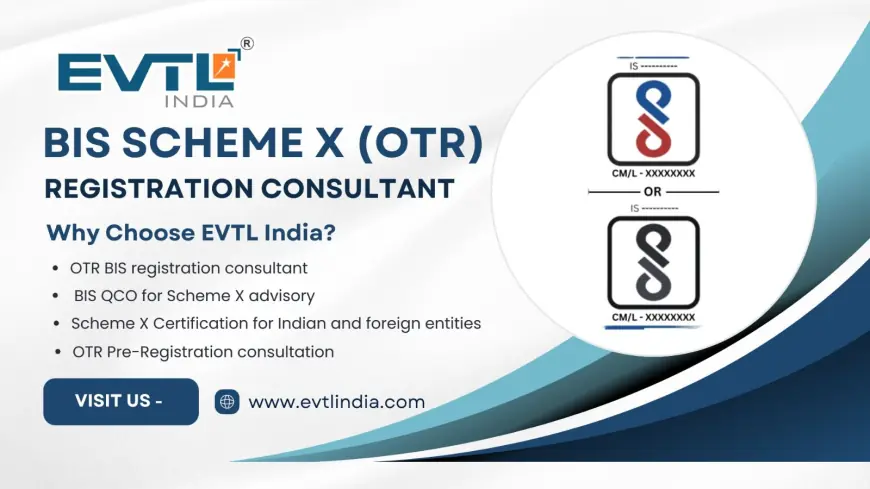Understanding BIS OTR Registration: A Must-Know for Every Manufacturer

In today’s evolving compliance ecosystem, ensuring that your products meet government standards before hitting the Indian market is no longer optional—it’s a necessity. And at the heart of this transformation is the BIS OTR Registration, a new-age gateway introduced by the Bureau of Indian Standards to simplify and streamline the compliance journey for both domestic and international manufacturers.
Let’s break down the OTR concept, explore how it impacts your business, and most importantly—why you shouldn’t wait till the last minute.
What is the OTR Scheme?
The OTR Scheme stands for Online Temporary Registration, a proactive initiative introduced by BIS to ensure that every manufacturer, whether local or foreign, is accounted for before applying for any standard certification. Think of it as your entry pass to India’s regulated product market.
This scheme was designed keeping two things in mind:
-
To create a central database of all prospective applicants.
-
To help BIS plan audits, testing, and inspection logistics well in advance.
Previously, manufacturers could directly jump to the certification process. But under the new compliance landscape, especially with the emergence of more QCOs (Quality Control Orders), this step has become essential.
Why is BIS OTR Registration Important?
It’s tempting to ask: “Why add another step?” But here’s the thing—BIS isn’t just ticking boxes; it’s tightening the quality loop.
BIS OTR Registration ensures that the manufacturer has a verified presence and provides preliminary technical, legal, and factory-related information even before applying for a specific license. This data-driven approach allows BIS to:
-
Pre-schedule factory audits.
-
Track manufacturer performance over time.
-
Filter out non-serious or non-compliant applicants.
For businesses, this means shorter certification cycles in the future and a greater chance of first-time approval.
Let’s Talk About OTR Pre-Registration BIS
The term OTR Pre-Registration BIS refers to the first official step manufacturers must complete before engaging in any formal product certification application. It’s applicable to both ISI and CRS schemes (for mandatory certification under Indian standards and Compulsory Registration Scheme respectively).
Here's what OTR Pre-Registration typically requires:
-
Basic manufacturer details (including production unit address and legal structure).
-
List of products you intend to get certified.
-
Factory layout, key personnel, and production capability.
-
Export/import history, if any.
By submitting this information, you essentially announce your intent to BIS—and prepare yourself for a faster and more predictable certification timeline.
Who Should Worry About BIS OTR QCO?
The BIS OTR QCO concept is simple: if a product is covered under any Quality Control Order notified by the Government of India, then manufacturers of such products must first register under the OTR portal before they can begin their certification process.
For example, let’s say a new QCO is released for lithium-ion batteries, electric fans, or furniture. If you're a foreign manufacturer wanting to sell these in India, you can't apply directly for a BIS license. Instead, you must first enroll under the OTR system—because BIS uses this as the base to schedule pre-license inspections, sample pickups, and lab testing slots.
Ignoring the OTR step? That’s like trying to board a flight without a ticket.
Role of a BIS OTR Registration Consultant
Now, here’s where things get real. The process may seem simple on paper—but in reality, many manufacturers find themselves stuck in document discrepancies, portal issues, or delays in pre-approval.
This is where a BIS OTR Registration Consultant plays a vital role. A good consultant helps with:
-
Accurate documentation as per BIS norms.
-
Filling up the OTR application without errors.
-
Coordinating with BIS for verification, clarifications, or inspections.
-
Guiding on timelines, mandatory declarations, and product grouping.
Especially for foreign brands, navigating India’s regulatory maze is challenging—and missing even a small detail can result in application rejection or long delays.
Hiring a consultant doesn’t just save time—it boosts your chances of smooth entry into one of the world's most dynamic markets.
Common Mistakes to Avoid in OTR Filing
Even though the BIS OTR system is digital and seemingly straightforward, many applicants get it wrong. Here are a few avoidable pitfalls:
-
Wrong factory address or coordinates: BIS often sends auditors or inspection officers based on GPS location—an error here can cost weeks.
-
Missing documents or unsupported file formats: Uploading a PDF when the portal demands a JPEG? That’s enough for rejection.
-
Incorrect product categorization: Every product belongs to a specific Indian Standard—getting this wrong will delay the licensing phase.
This is why it's important to treat the OTR application with the same seriousness as your final certification process.
What Happens After OTR Approval?
Once your OTR application is approved, BIS assigns you a unique OTR number and activates your manufacturer profile on its portal. From there, you can proceed to:
-
Apply for ISI or CRS certification.
-
Schedule your product testing and audit inspection.
-
Submit samples to recognized BIS labs.
-
Track your application’s progress through a single dashboard.
In short, OTR is not the end—it's the beginning of a fully traceable and transparent certification journey.
Why Early Compliance Matters
With the growing number of QCOs and tightening enforcement mechanisms, waiting till the last moment to comply could be a business disaster. Not only will late applicants face delays, but there’s also a growing risk of border seizures and import rejections for uncertified products.
BIS has made it clear: compliance is no longer optional—it’s the price of entry.
That’s why smart manufacturers are prioritizing early BIS OTR Registration, even before the QCO deadlines are officially enforced. It gives them a clear head start, avoids legal complications, and demonstrates seriousness toward Indian standards.
Conclusion
EVTL India is one of the leading BIS Consultant in India, helping manufacturers obtain their BIS licences hassle-free. In a fast-moving regulatory environment, BIS is turning into more than just a certifying body—it’s becoming a compliance backbone for India’s product ecosystem.
And at the heart of this evolution is the OTR Scheme—a silent but powerful filter that ensures only quality-conscious manufacturers make it to the certification phase. Whether you're an ambitious startup or a global brand, OTR is your first handshake with Indian standards.
Don’t underestimate it. Don’t delay it. Get the right consultant, prepare thoroughly, and position your brand for long-term success in one of the world’s most promising markets.
What's Your Reaction?
 Like
0
Like
0
 Dislike
0
Dislike
0
 Love
0
Love
0
 Funny
0
Funny
0
 Angry
0
Angry
0
 Sad
0
Sad
0
 Wow
0
Wow
0
















































